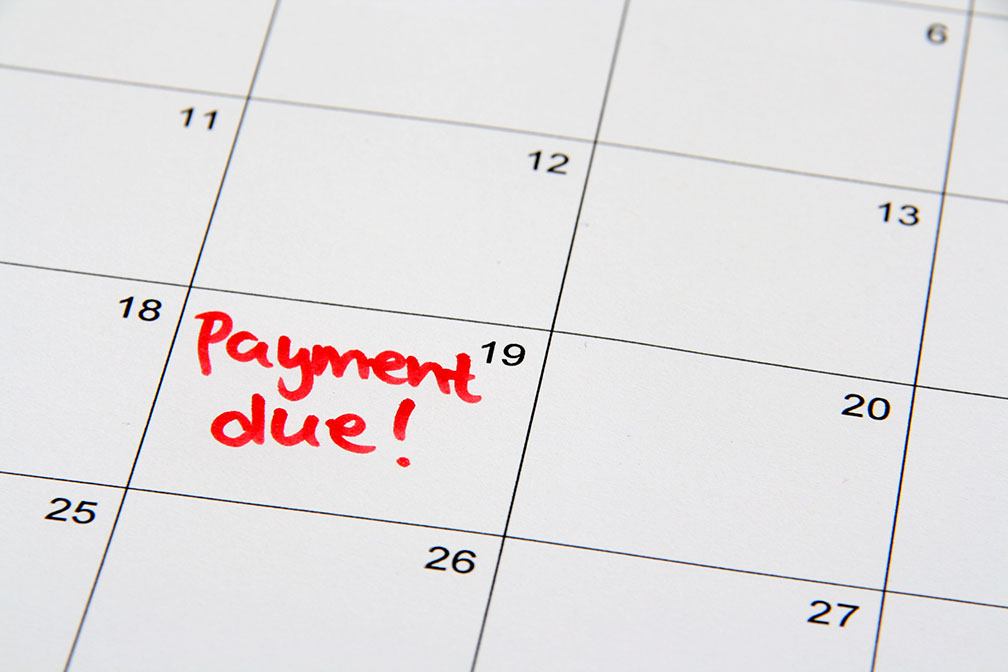 Are you the type of person that struggles with remembering to pay their bills on time? You’re not alone. People across the country regularly submit late monthly payments, inflicting terrible damage to their credit. Let’s take a quick look at how paying your loan or other monthly payments late can have a negative impact on your mortgage.
Are you the type of person that struggles with remembering to pay their bills on time? You’re not alone. People across the country regularly submit late monthly payments, inflicting terrible damage to their credit. Let’s take a quick look at how paying your loan or other monthly payments late can have a negative impact on your mortgage.
Your Credit Score Is At Risk
As you already know, almost all banks, credit cards, mortgage companies and other lenders rely on your credit score to help assess the risk of lending money to you. Paying any of your payments late – even something as small as your mobile phone bill or a department store credit card – can result in negative marks showing up on your credit report. If you are late enough times or fail to repay the late payment in full, then your score will start to drop.
Refinancing Can Be Affected
If you already have a mortgage, then a lower credit score can be a problem when you try to refinance. The process of refinancing involves taking out a new mortgage, in which your lender will reassess your risk using your credit score as one of the indicators. If you have been making late payments, you might end up having to settle for a higher interest rate or you may even be declined for the new mortgage.
Making A Late Payment? Contact Your Lender
If you are caught in a bind and have to make a late payment, it is best to get a call in to your lender as soon as possible. First, there may be a grace period in which you can be a few days late without any penalty. If that little bit of breathing room is all you need to get caught up, you’re set. If not, you can let them know your circumstances and discuss what options you have.
It is essential to pay your monthly payments on time, even if it means making some small sacrifices in other areas. The better your credit score looks, the more opportunities you will have to make positive financial moves in the future. To learn more about monthly mortgage payments or to take out a mortgage on a new home, contact us today. Our team of mortgage professionals is here to help you find a mortgage to buy the home of your dreams.
 Do you have an empty basement or separated suite in your home? If you have a suite sitting empty, you are missing out on collecting some extra monthly income in the form of rent. Let’s take a look at a quick four-step process that will help you find the perfect tenant to rent out your basement suite.
Do you have an empty basement or separated suite in your home? If you have a suite sitting empty, you are missing out on collecting some extra monthly income in the form of rent. Let’s take a look at a quick four-step process that will help you find the perfect tenant to rent out your basement suite. In addition, 15-year fixed mortgage rates have gone up as well, with the national average sitting at around 6.82 percent. This is up from last week, when the average 15-year fixed was 6.51 percent. This is also up slightly from August, where the rates hovered around 5.84 percent.
In addition, 15-year fixed mortgage rates have gone up as well, with the national average sitting at around 6.82 percent. This is up from last week, when the average 15-year fixed was 6.51 percent. This is also up slightly from August, where the rates hovered around 5.84 percent. For many people, putting their home up for sale is an exciting time. With real estate on the rise, there are plenty of opportunities to see financial gains. Unfortunately, even if you’re selling your home, there are still going to be costs involved before ownership is transferred. If you want to be prepared for what to expect, here are some costs to watch out for.
For many people, putting their home up for sale is an exciting time. With real estate on the rise, there are plenty of opportunities to see financial gains. Unfortunately, even if you’re selling your home, there are still going to be costs involved before ownership is transferred. If you want to be prepared for what to expect, here are some costs to watch out for. If you’re a homeowner with children, at some point, you’ll be saying goodbye. They’ll move off to college or to start their career and adult life. As children move out, you’ll discover that you have extra bedrooms and other living spaces that will need a new purpose. Let’s take a look at three ways that you can transform an unused bedroom into a welcoming place for guests to stay.
If you’re a homeowner with children, at some point, you’ll be saying goodbye. They’ll move off to college or to start their career and adult life. As children move out, you’ll discover that you have extra bedrooms and other living spaces that will need a new purpose. Let’s take a look at three ways that you can transform an unused bedroom into a welcoming place for guests to stay. You’ve scoured the new home listings, been to all the open houses and have finally found the home of your dreams. It is now time to draft an offer and begin the negotiation process. Below we’ll share four mistakes that you will want to avoid when making an offer on your dream home.
You’ve scoured the new home listings, been to all the open houses and have finally found the home of your dreams. It is now time to draft an offer and begin the negotiation process. Below we’ll share four mistakes that you will want to avoid when making an offer on your dream home. Managing multiple debts can become overwhelming and burdensome. Juggling various loan payments with varying interest rates and repayment terms can lead to financial stress and missed opportunities. One solution that borrowers often consider is consolidating their debts through a mortgage refinance loan. While this approach can be beneficial for some, it’s crucial to carefully evaluate its pros and cons before deciding.
Managing multiple debts can become overwhelming and burdensome. Juggling various loan payments with varying interest rates and repayment terms can lead to financial stress and missed opportunities. One solution that borrowers often consider is consolidating their debts through a mortgage refinance loan. While this approach can be beneficial for some, it’s crucial to carefully evaluate its pros and cons before deciding.